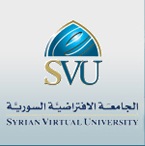Syrian Virtual University
This article has multiple issues. Please help improve it or discuss these issues on the talk page. (Learn how and when to remove these messages)
|
الجامعة الإفتراضيّة السوريّة | |
 | |
| Type | Public |
|---|---|
| Established | 2002 |
| President | Dr. Riad Daoudi |
| Nickname | SVU |
| Website | http://www.svuonline.org |
The Syrian Virtual University (الجامعة الإفتراضيّة السوريّة) is a Syrian educational institution established by the Syrian Ministry of Higher Education. It provides virtual education (using the Internet) to students from around the world. It was established on 2 September 2002 and is the first virtual education institution in the region, and as of 2006, remains the only one. The goals of the SVU include offering education to those who want to learn but cannot afford to do so by going to a "brick and mortar" university. It is headquartered at the Ministry of Higher Education building, Damascus.
Academic programs
SVU provides two kinds of academic programs: partnership programs, those provided in cooperation with foreign universities; and domestic programs, those that are authored by the SVU and taught by local Syrian professors.
Domestic Programs
All domestic programs are provided in Arabic (except for the English HND), some courses are taught in English. Originally, all domestic SVU programs were related to Computer Science, but two new programs in Economics were added in 2007. There is currently a total of six domestic degree programs.
2-year Undergraduate Programs
HND
HND stands for the Higher National Diploma in Computing and Business Applications. It is offered in English and Arabic. The duration of study is two years. HND is available in two versions, one taught in Arabic and another in English.
5-year Undergraduate Programs
ISE
ISE is a credit-based BSc program in Information Systems Engineering. The content is very much that of a traditional Computer Science degree, but offered online. The student has to take a number of "core courses" and then a number of "specialized courses" with the aid of a career planner. There are currently (as of 2008) four core specialization areas: Software Application Development, Multimedia Systems, Networking and Operating Systems, and Intelligent Systems. It is possible to choose an emphasis within a core specialization area. A student must complete requirements in one or more specialization areas to graduate. The duration of study is (typically) five years.
4-year Undergraduate Programs
BIT
BIT is a program leading to a Bachelor degree in Information Technology.
BA in Economics
The SVU offers a BA in Economics, with three possible branches: Business Administration, Banking and Finance, and Marketing. Duration of study is four years.
BA in Law
This 4-year program is a BA in law, with several specializations, including criminal and constitutional law.
Postgraduate Programs
MBA
The SVU offers an MBA degree. The Duration is two years. The total tuition cost is around $3500.
MTM
Academic master's degree in Technology Management, with an emphasis on technology transfer, development through technology and application of new technologies in businesses, industries and societies.
MQM
A Master's degree in Quality Management. The Duration is two years. The total tuition cost is around $3500.
MWT
A Master's degree in web technologies.
MWS
A Master's degree in Web Sciences.
DP
Doctoral Program in Syrian Virtual University.
Controversy and Acceptance
Internet Access
Now Students have a wide choice of affordable internet connections that can accommodate the e-learning software requirements, starting as low as 10 USD a month students can use 3G Internet anywhere in Syria via the mobile phone network or they can register for ADSL service which has become openly available from 30 USD/month.
While today not a problem,One of the issues which the SVU faced during its launch phase was the lack of a proper broad-band Internet infrastructure in Syria. This can be viewed as a strategic problem, as it hinders potential students. Faced with the terrible performance of the teleconferencing software on Dial-Up (then the only available option), the university created a number of telecenters (at a great expense) in various Syrian governorates so that students who didn't have broadband Internet (virtually all of them) could attend their lessons comfortably. With the introduction of ADSL and ISDN in 2004, it was hoped that the severity of the problem would be ameliorated. Unfortunately, the situation has not improved much: up to the end of 2007, ADSL is not yet available to students and the general public. Subscriptions are fewer than 5000 in number all over Syria and the cost for any potential adopter is too high (the actual going rate for an ADSL line is almost $1000, due to unavailability and very great demand by Internet Cafes). ISDN, while difficult to attain in many areas, is more publicly available than ADSL, and thus is the only option for Syrian SVU students who wish to attend lessons from their homes. Most Syrian SVU students, however, attend their lessons from a local telecenter.
Quality of Teaching Materials
Although some problems existed in the foundation programs at first. Today SVU has a very strong base of course material students can study from.
